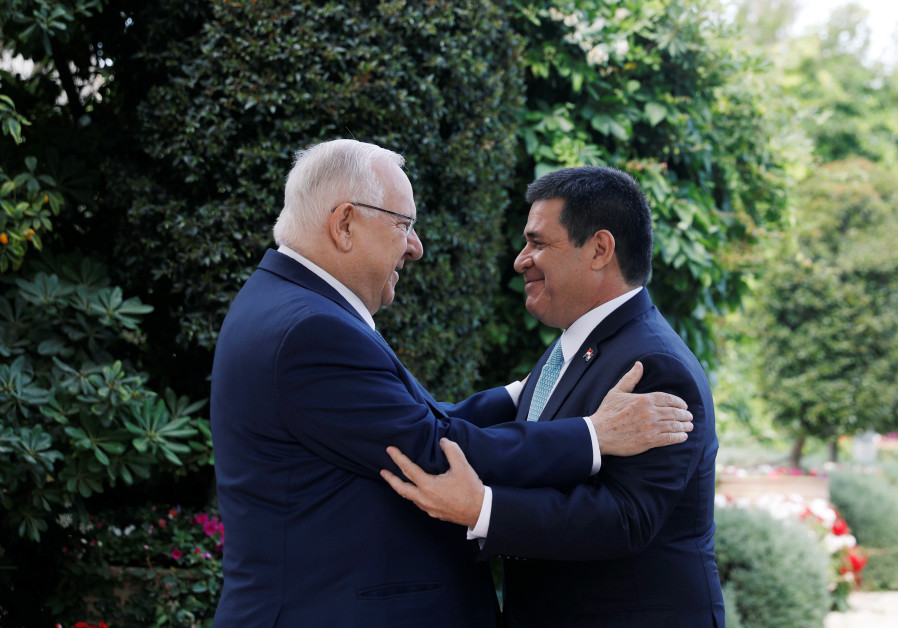In quip to Rivlin, Paraguay’s president awaits more Israel visits

Israeli President Reuven Rivlin embraces Paraguayan President Horacio Cartes upon his arrival for a meeting at his residence in Jerusalem, ahead of the dedication ceremony of the embassy of Paraguay in Jerusalem, May 21, 2018. (photo credit: RONEN ZVULUN / REUTERS)
Two hours ahead of the inauguration of his country’s embassy in Jerusalem, outgoing Paraguayan President Horacio Cartes met with President Reuven Rivlin, and assured him that he will visit Israel “much more often” after the expiration of his term in August.
Paraguay officially moved its country’s embassy to Jerusalem on Monday, the third such move within the space of a week after the US move last Monday and Guatemala’s on Wednesday.
It is also the second embassy, after Guatemala’s, to move into the Malcha Technology Park, which may well evolve into the capital’s embassy row.
Cartes, who was in Israel two years ago, said that he feels “very comfortable” and “very much at home” in Israel. He repeated this several times in the course of his conversation with Rivlin, adding that he had decided to move the embassy because it was “the right thing to do.”
Cartes reportedly made the decision without consulting or notifying his successor, president-elect Mario Abdo Benítez, who could conceivably move the embassy back to its former address in Herzliya Pituah sometime later this year.
In January 2011, Paraguay recognized Palestine as a state, and Cartes’ decision has therefore created considerable controversy and divisiveness in his country.
Hanan Ashrawi, who sits on the Executive Committee of the Palestinian Liberation Organization, called on him to withdraw his decision, and Palestinian Authority President Mahmoud Abbas urged other Latin American states not to follow the example set by Guatemala and Paraguay.
Cartes was warmly welcomed by Rivlin, who waited on the grounds of the President’s Residence to greet him and walked arms around shoulders with him into the building.
Because he is aware that Cartes has good relations with the Palestinians and intends to act as a goodwill intermediary between them and Israel after he is out of office, Rivlin made the point that regardless of whether there is a one-state or two-state solution, the Palestinians could rule the second democracy in the Middle East.
“They can’t live under a dictatorship,” he said, noting that those Palestinians who live in Israel, know what democracy means.
While lamenting that Israel has no confidence in the Palestinians and that they likewise have no confidence in Israel, Rivlin was adamant in stating that: “They have to realize we are here and that no one can take us out – and we have to realize that they are here.”
He was hopeful that someday the two sides would find a mutually beneficial way to live together.
Meanwhile, he was looking forward to greeting Cartes again next year as his official guest at the World Congress of Hispanic Literature that will be held at the Hebrew University in Jerusalem. Last week he also issued the same invitation to President Juan Carlos Varela of Panama.
Both Rivlin and Cartes spoke of the long diplomatic relationship between their two countries, with Cartes underscoring that Paraguay had been one of the 33 countries which in November 1947 voted for the partition of Palestine. Rivlin took pleasure in the fact that many of Paraguay’s government ministers over the years were graduates of Mashav, Israel’s Agency for International Development Cooperation which is under the aegis of the Ministry of Foreign Affairs.





Comments are closed.